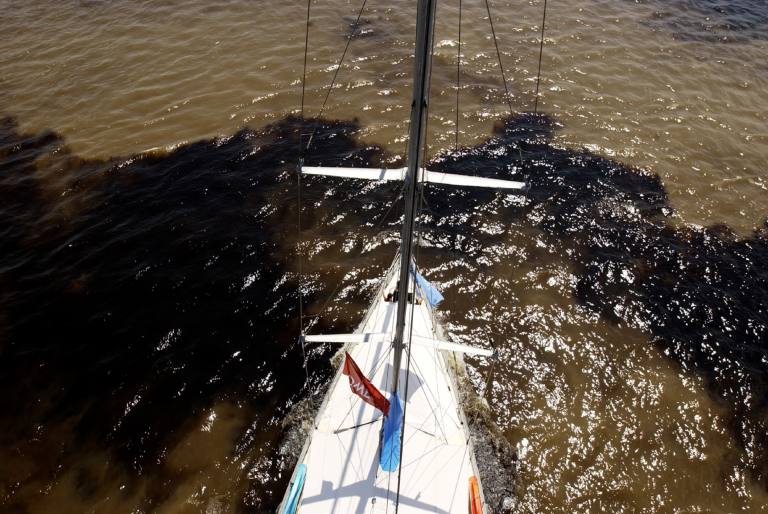“The issue of looking after the environment, even if it costs political votes in the short term, is a change that HAS to happen.”
– Sir Peter Blake Trust
1200 hrs: We’ve left Barcelos after a very interesting few days; on our way through here, heading up-river, we only stopped overnight, but to have the luxury of more time has unearthed some scenes that we didn’t know existed.
Yesterday, Charlie spent some hours as a roving reporter, notebook in hand and with Paulo as interpreter, talking to families on their riverboats – finding out more about their lifestyles; his report will follow soon.
Pippa took a myriad of photos amongst the colourful craft that were tied up near a small creek.
And we had a few hours with a local boat builder – a builder of bongos.
Rob took delight in giving a hand to plane and caulk and discuss the process.
The builder took us out motoring on his own large bongo – essentially made from 3 very large planks of timber that ran the full length of the boat. The black plastic-covered shelter completed the scene.
As dusk approached, children with featherweight kites lined the shore, flying them well on the wafts of breeze off the river, while others bathed, or just played around as children everywhere do.
I think we were more the centre of attraction, rather than the other way round.
So that was our Monday.
Saturday and Sunday were rather more hectic.
The Prime Minister of New Zealand, Helen Clark, and a support party of 9 joined us from Manaus around 2pm on Saturday afternoon.
On the extended table between the masts, covered in banana leaves that had been cut that morning, lunch was served as Seamaster motored to a perfect night anchorage only 10 miles away.
The pink dolphin, the boto, greeted us as we slowed in the entry channel.
We had hardly been at rest for more than a few minutes before the kayaks were in the water, the dinghies loaded, and we went exploring the waterways and lagoons within the forest nearby.
After an hour of drifting and listening to the parrots and toucans, we all walked along the large sandbar that took us through until dark.
Birds’ eggs in shallow depressions in the sand and caiman eyes staring at us from the green surface scum in the middle of a small lake were followed by dinner onboard – then another dinghy ride for those that wished, with our pilot Bosco taking charge. It was pitch black as we entered the same waterways, trees overhanging, with different noises to the daytime.
The caiman that lay and stared at us was only small – maybe a metre long – but it stayed quite a while before submerging and easing away through the dead branches of an old tree lying in the river.
To have 10 extra persons onboard meant that most of our new guests were each destined for a night in a hammock – accommodation in the cabins being full; most, except the Prime Minister, the NZ ambassador to Brazil, Denise Almao, and the soon-to-be reappointed ambassador to the USA, John Wood; they had bunks down below.
I think those that slept above decks found it very comfortable and a new experience. Luckily the weather stayed fine even though thick cloud began to develop and there was a lot of early lightning away to the southeast.
Soon after dawn it was “up anchor” again heading back to Barcelos with breakfast served on the way. By 8.45 am, the party was ashore and on their way back to Manaus.
The reason for the visit?
Helen Clark has a real interest in the environment.
We have both spent time highlighting the plight of the whales; we were both together for a United Nations Environment Programme luncheon in Auckland in July, and we are both keen to do as much as we can to “make a difference”.
The issue of looking after the environment, even if it costs political votes in the short term, is a change that HAS to happen. Thank goodness that New Zealand has a Prime Minister in Helen Clark who has recognised the overriding need for such an approach.
Her attitude is to be applauded.
With her first-ever visit to Brazil about to start, she wanted to spend some time in a remote region, finding out more about the country.
I hope she found some of what she wanted during her time with us.
So we have now left Barcelos but we haven’t gone very far, as the port engine coupling has broken;. There was the smell of burning rubber soon after departure, and the propeller stopped rotating. Luckily we have a spare onboard, but it is proving a long job removing and replacing.
Why it has disintegrated we don’t yet know, but everything else appears fine.
One of us will dive on the propeller shortly to make sure it is clear, and by late afternoon we should be underway again – at least to a new anchorage before dark sets in.
This is the Rio Negro.
This is the Amazon.
All the best from the Seamaster crew.
Kind regards,
Peter
In our next Seamaster Log we will have a special article by Professor Mario Christian Meyer – an expert in matters Amazonian.
Photo credit: Don Robertson


